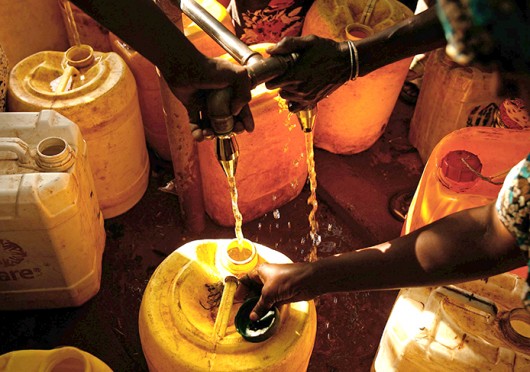
Water is scant in Kenya’s North Eastern Province where rainfall is rare and rivers are scarce. Refugees gather at one of the camp’s water points to collect water used for cooking and drinking. Credit: Courtesy of MCT
Poverty. We see it everywhere: on the subway, on the street and nestled in the dark, dusty nooks and crannies of our campus and city — an ever-looming, oh-so-silent reminder of our fortune and others’ plight. We all know it exists, we all admit it’s a problem and we all, for the most part, have felt that itch — that overwhelming desire to serve. Be it on mission trips abroad, amid the hustle and bustle of a soup kitchen, or through bags upon bags of donated goods, Americans serve their less-than-affluent counterparts with an unmatched vim and an unchecked vigor. Yet unbeknownst to us, as we toil and sweat with myriad “service” projects, we often do more harm than good.
Alongside eight other Ohio State Students, I learned this unsettling yet illuminating fact through a Buck-I-SERV trip with Partners for Care, a nonprofit that actively combats warped conceptions of service. Run by Atlanta’s Connie Cheren, Partners for Care seeks to empower Kenyans in developing sustainable solutions to age-old, poverty-linked problems. The organization helps Kenyans help themselves through their role as a medium: they raise funds and resources here in the United States to support an on-the-ground team of Kenyan nationals.
While American missions often waste billions in the sheer transportation, housing and feeding of volunteers, PFC decreases this expenditure by directly supporting their Kenyan team. This team then works to develop the nation through jigger treatment, HIV/AIDS education and the distribution of water-packs. These water-packs, produced by Ohio-based packaging company Greif, Inc., are revolutionizing the Kenyan water scene and changing lives.
“Jerry Cans” — the traditional mechanism by which Kenyans transport water — are fraught with both mechanical and health-related issues. They are not only heavy and difficult to transport, but are also easily contaminated, contributing largely to fatal, water-born illness among children and adults. Water-packs, by contrast, are easily carried and use solar sanitation for decontamination purposes.
With all this newfound knowledge under our belts, we, as OSU students and largely, more fortunate members of society, entered an uncomfortable yet essential period of self-reflection. Had our past service — be it through religious institutions, local organizations or even school — been to no avail? Had we, in our countless quests to help, actually harmed? How could we have overlooked organizations like Partners for Care and PackH2O, which address problems by empowering nationals and creating lasting solutions?
Though our time with PFC was brief, we as volunteers harnessed this new understanding of service as motivation for our various tasks, which included research, writing and sorting donated goods. Rather than sending these goods directly to families, which could perpetuate dependency and hurt the pride of parents, they were instead sent to an inexpensive store founded by the nonprofit Community Grounds where they could then be purchased at low prices by poor families. The parents themselves — not imposing, ever-intrusive “do-gooders” — could give their children a holiday gift.
While many Buck-I-SERV trips end as their buses depart, I am certain that our experience with Partners for Care will extend beyond our work this week. Connie — our host, leader and symbolic mother — has imparted not only the importance of meaningful, well-planned and constructive service, but also the far-reaching impact of passion. A passion for giving back is what drove us to Atlanta, and a passion for constructive service will continue to drive us in our endeavours in Columbus.


